初中一般将来时
初中英语语法一般将来时

初中英语语法一般将来时【初中语法系列】一般将来时,结构是重点!一般将来时是初二英语要研究的内容,在初中整个语法系统中占非常重要的内容,也是历次考试的高频考点.1一般将来时的含义一般将来时表示将来某个时间要发生的动作或状态,或将来经常发生的动作或状态。
2一般将来时的基本结构1. will/shall+动词原形will在陈述句中用于各种人称;shall用于第一人称,常被will所代替。
否定式:will not=won'tshall not=shan't一般疑问式:will/shall+主语+动词原形+其他?特殊疑问式:特殊疑问词+一般疑问式?I will/shall do a better job next time.下次我要做得好些。
Oil and water will not mix.油和水没法混在一起。
—Will he help you with your English tonight?今天晚上他会帮助你研究英语吗?—Yes, he will./No, he won't.是的,他会。
/不,他不会。
—When will you arrive for America?你什么时候去美国?—Tomorrow.来日诰日。
2. am/is/are going to +动词原形否认式:am/is/are not going to +动词真相普通疑问式:am/is/are +主语+ going to +动词真相+其他?特殊疑问式:特殊疑问词+普通疑问式?He is going to spend his holidays in London.他打算在伦敦度假。
Look at the dark clouds. There is going to be a storm.看那乌云,快要下雨了。
Is he going to collect any data for us?他会帮我们搜集数据吗?What are you going to do tomorrow?明天你打算作什么?3will+动词原形与am/is/are going to +动词原形的用法区别will+动词原形与am/is/are going to +动词原形的用法虽然都表示将来发生动作或情况,一般情况下能互换。
初中语法知识之一般将来时
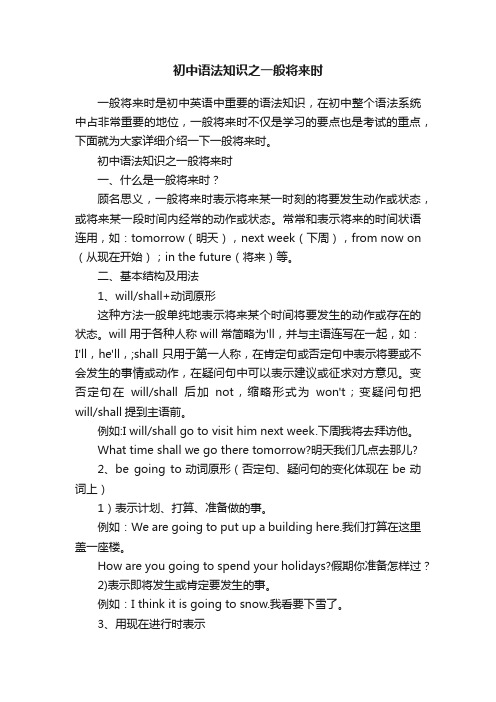
初中语法知识之一般将来时一般将来时是初中英语中重要的语法知识,在初中整个语法系统中占非常重要的地位,一般将来时不仅是学习的要点也是考试的重点,下面就为大家详细介绍一下一般将来时。
初中语法知识之一般将来时一、什么是一般将来时?顾名思义,一般将来时表示将来某一时刻的将要发生动作或状态,或将来某一段时间内经常的动作或状态。
常常和表示将来的时间状语连用,如:tomorrow(明天),next week(下周),from now on (从现在开始);in the future(将来)等。
二、基本结构及用法1、will/shall+动词原形这种方法一般单纯地表示将来某个时间将要发生的动作或存在的状态。
will用于各种人称will常简略为'll,并与主语连写在一起,如:I'll,he'll,;shall只用于第一人称,在肯定句或否定句中表示将要或不会发生的事情或动作,在疑问句中可以表示建议或征求对方意见。
变否定句在will/shall后加not,缩略形式为won't;变疑问句把will/shall提到主语前。
例如:I will/shall go to visit him next week.下周我将去拜访他。
What time shall we go there tomorrow?明天我们几点去那儿?2、be going to动词原形(否定句、疑问句的变化体现在be动词上)1)表示计划、打算、准备做的事。
例如:We are going to put up a building here.我们打算在这里盖一座楼。
How are you going to spend your holidays?假期你准备怎样过?2)表示即将发生或肯定要发生的事。
例如:I think it is going to snow.我看要下雪了。
3、用现在进行时表示表示位置转移的动词(如:go,come,leave,start,arrive等),可用现在进行时表示将来时。
(完整版)初中一般将来时讲解

(完整版)初中一般将来时讲解初中一般将来时是英语中表达将来时间的一种时态,它用来表示将来某个时间将要发生的动作、事件或情况。
本文将对初中一般将来时进行详细讲解。
一、构成初中一般将来时的构成主要由以下几个部分组成:1. 助动词“will”,用于表示将来。
2. 动词的原形(即不带to的动词原型)。
二、用法初中一般将来时主要有以下几种用法:1. 表示将来的计划或意图。
例如:- I will study harder in order to pass the exam. - They will go on a trip next week.2. 表示预测或推测。
例如:- It will rain tomorrow.- The team will win the game.3. 表示承诺或意愿。
例如:- I will help you with your homework.- We will support you all the way.4. 表示意愿或请求。
例如:- Will you please open the window?- I will go shopping if you want.三、注意事项在初中一般将来时的使用中,需要注意以下几点:1. 助动词“will”后面直接接动词的原形,不带任何变化。
2. 否定句在助动词“will”后面加上“not”构成,缩写形式为“won't”。
3. 疑问句将助动词“will”提到句子的主语之前。
四、例句以下是一些初中一般将来时的例句:1. I will travel to Japan next year.3. Will you go to the beach tomorrow?五、总结初中一般将来时是英语中一种表示将来时间的时态。
在使用时,需要注意助动词“will”的使用以及动词的原形。
它可以用于表示计划、预测、承诺等。
希望本文能够对您的学习有所帮助。
初中英语一般将来时
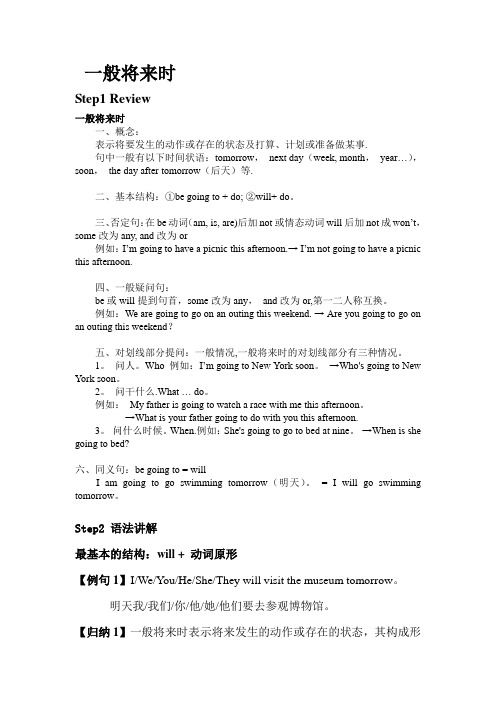
一般将来时Step1 Review一般将来时一、概念:表示将要发生的动作或存在的状态及打算、计划或准备做某事.句中一般有以下时间状语:tomorrow,next day(week, month,year…),soon,the day after tomorrow(后天)等.二、基本结构:①be going to + do; ②will+ do。
三、否定句:在be动词(am, is, are)后加not或情态动词will后加not成won’t,some改为any, and改为or例如:I’m going to have a picnic this afternoon.→ I’m not going to have a picnic this afternoon.四、一般疑问句:be或will提到句首,some改为any,and改为or,第一二人称互换。
例如:We are going to go on an outing this weekend. → Are you going to go on an outing this weekend?五、对划线部分提问:一般情况,一般将来时的对划线部分有三种情况。
1。
问人。
Who 例如:I’m going to New York soon。
→Who's going to New York soon。
2。
问干什么.What … do。
例如:My father is going to watch a race with me this afternoon。
→What is your father going to do with you this afternoon.3。
问什么时候。
When.例如:She's going to go to bed at nine。
→When is she going to bed?六、同义句:be going to = willI am going to go swimming tomorrow(明天)。
初中一般将来时(通用版,含答案)
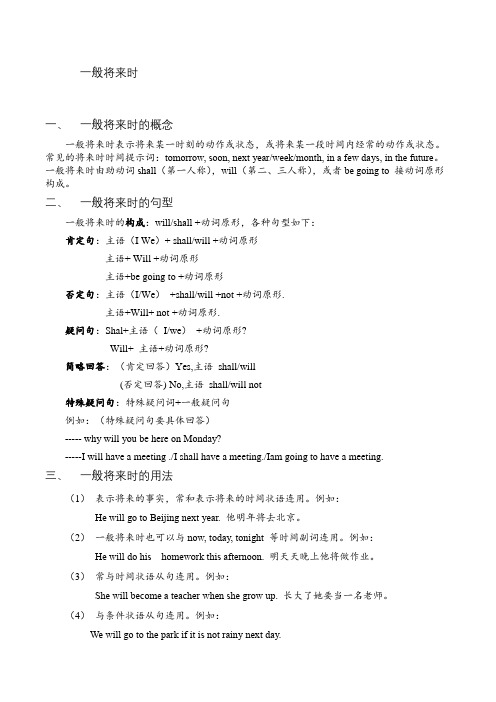
一般将来时一、一般将来时的概念一般将来时表示将来某一时刻的动作或状态,或将来某一段时间内经常的动作或状态。
常见的将来时时间提示词:tomorrow, soon, next year/week/month, in a few days, in the future。
一般将来时由助动词shall(第一人称),will(第二、三人称),或者be going to 接动词原形构成。
二、一般将来时的句型一般将来时的构成:will/shall +动词原形,各种句型如下:肯定句:主语(I We)+ shall/will +动词原形主语+ Will +动词原形主语+be going to +动词原形否定句:主语(I/We)+shall/will +not +动词原形.主语+Will+ not +动词原形.疑问句:Shal+主语(I/we)+动词原形?Will+ 主语+动词原形?简略回答:(肯定回答)Yes,主语shall/will(否定回答) No,主语shall/will not特殊疑问句:特殊疑问词+一般疑问句例如:(特殊疑问句要具体回答)----- why will you be here on Monday?-----I will have a meeting ./I shall have a meeting./Iam going to have a meeting.三、一般将来时的用法(1)表示将来的事实,常和表示将来的时间状语连用。
例如:He will go to Beijing next year. 他明年将去北京。
(2)一般将来时也可以与now, today, tonight 等时间副词连用。
例如:He will do his homework this afternoon. 明天天晚上他将做作业。
(3)常与时间状语从句连用。
例如:She will become a teacher when she grow up. 长大了她要当一名老师。
初中一般将来时讲解
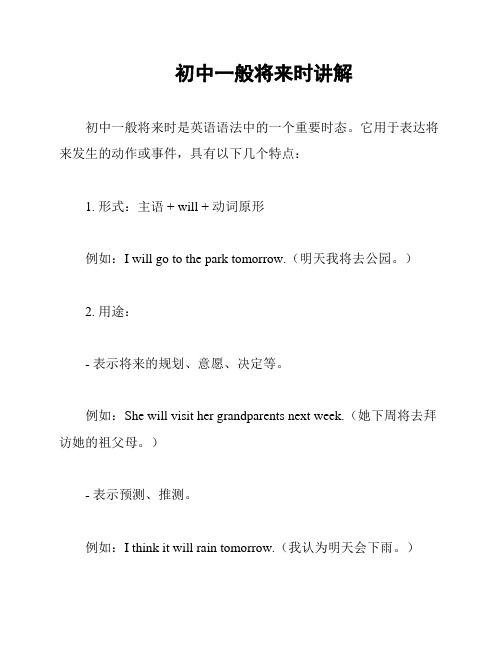
初中一般将来时讲解初中一般将来时是英语语法中的一个重要时态。
它用于表达将来发生的动作或事件,具有以下几个特点:1. 形式:主语 + will + 动词原形例如:I will go to the park tomorrow.(明天我将去公园。
)2. 用途:- 表示将来的规划、意愿、决定等。
例如:She will visit her grandparents next week.(她下周将去拜访她的祖父母。
)- 表示预测、推测。
例如:I think it will rain tomorrow.(我认为明天会下雨。
)- 用于官方通知、邀请、警告等场合。
例如:The school will hold a party next month.(学校下个月将举办一次聚会。
)- 用于做出决定或提供帮助。
例如:I will help you with your homework.(我将帮助你完成作业。
)3. 注意事项:- 表示将来的时间状语词一般使用,如tomorrow(明天)、next week(下周)等。
- 一般将来时常与表示将来的时间状语词或时间状语从句一起使用。
- 对于第一人称(I)和第二人称(you)的陈述句,可以使用缩略形式:I'll, you'll。
4. 示例:- She will go to the cinema this evening.- They will have a picnic in the park.- We will study Spanish next semester.- He will go on vacation next month.总之,初中一般将来时是英语语法中的重要时态,可以表达将来发生的动作或事件,同时也可以用于表示意愿、决定、预测等场合。
掌握这一时态的用法有助于学生加深对英语语法的理解。
初中英语一般将来时
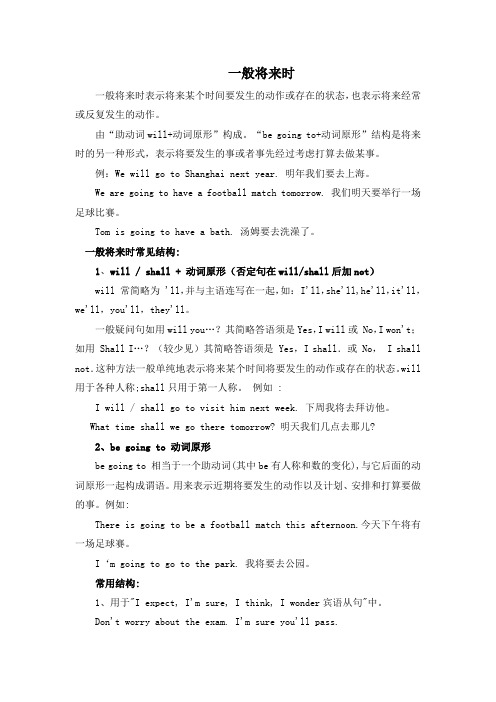
一般将来时一般将来时表示将来某个时间要发生的动作或存在的状态,也表示将来经常或反复发生的动作。
由“助动词will+动词原形”构成。
“be going to+动词原形”结构是将来时的另一种形式,表示将要发生的事或者事先经过考虑打算去做某事。
例:We will go to Shanghai next year. 明年我们要去上海。
We are going to have a football match tomorrow. 我们明天要举行一场足球比赛。
Tom is going to have a bath. 汤姆要去洗澡了。
一般将来时常见结构:1、will / shall + 动词原形(否定句在will/shall后加not)will 常简略为 'll,并与主语连写在一起,如: I'll,she'll,he'll,it'll,we'll,you'll,they'll。
一般疑问句如用will you…?其简略答语须是Yes,I will或 No,I won't;如用 Shall I…?(较少见)其简略答语须是 Yes,I shall.或 No, I shall not.这种方法一般单纯地表示将来某个时间将要发生的动作或存在的状态。
will 用于各种人称;shall只用于第一人称。
例如 :I will / shall go to visit him next week. 下周我将去拜访他。
What time shall we go there tomorrow? 明天我们几点去那儿?2、be going to 动词原形be going to 相当于一个助动词(其中be有人称和数的变化),与它后面的动词原形一起构成谓语。
用来表示近期将要发生的动作以及计划、安排和打算要做的事。
例如:There is going to be a football match this afternoon.今天下午将有一场足球赛。
初中英语语法一般将来时

一般将来时一.一般将来时的定义:表示将来某一个时间将要发生的动作或存在的状态,表示将来经常或重复发生的动作。
二.一般将来时的标志:tomorrow(明天),the day after tomorrow(后天)next year(明年)next month(T—个月)next week(下一个星期)3.一般将来时的构成:1.主语^be(am,is,are)going to+动词原形+..例如:(1).I am going to play football tomorrow.明天我将要踢足球.(2).She is going to watch a movie the day after tomorrow.后天她要看一场电影.2.主语+will/shall+动词原形+.....说明:(l).will/shall有时可以和be going to互换;(2) .will是万能的,shall只能用在第一人称,主语是I,we.(3) .will和shall的后而接动词原形)例如shall/will go to Beijing next month.。
will=I11)下个月我将要去北京.(2) .You will come to see me tomorrow.(you will=you'll)明天你将要来看我.(3) .She will read English tomorrow moming.(She will=She'll)明天早上她将要读英语.四.句一般将来时的式:1.肯定句:(1) ..主语+be(am,is,are)going to+动词原形+......(2) ..主语+will/shall+动词原形+.....例句和上面一样,就不举了.2.否定句:(1)..主语+be(am,is,are)not going to+动词原形+......例如:(A):I am not going to play basketball tomorrow.明天我不将踢足球.(B).She is not/isn't going to visit Shanghai next year.明年她不将参观上海.(2)..主语+will/shall not+动词原形+.....(A).I shall not go to school the day after tomorrow o后天我不将上学了(B).I will not write my homework this evening.(will notl=I won't)今晚我不将写作业(C).She will not see a movie next week.(will not=won't)下个星期她将不看一场电影.3.一般疑问句:(A).Am/Is,Are+主语+going to+动词原形+....例如(A).—Am I going to see my grandfather tomorrow?明天我将去看我的爷爷吗?—Yes,you are.是的,你将去.(B).— Are you going to listening to the tape tomorrow?明天你将听录音带吗?—No,I am not.不,我不将.(C). —Is she going to Beijing next year? 明年我将去北京吗?-Yes,she is.是的,她将.(2).Will//shall+主语+动词原形+…例如(A). —Shall we play volleyball next class?下一节课我们将打排球吗?-Yes,you will,是的,你们将.(B). —Will you come here next week?下个星期你将来这儿吗?-Yes,I will.是的,我将.(C).--Will she teach us this term?这学期,她将教我们吗?—Yes,she will.是的,她将.4.特殊疑问句:(1).What(Where,How...)+be(am,is,are)+主语+going to+动词原形+...?例如:(A).—What are you going to do tomorrow? 明天你将要做什么?—rm going to the park? 我将要去动物园.(B).--Where are you going to swim? 你将要去哪儿游泳?—I'm going to swim in the river.(2). What(When,Where,How...)+主语+动词原形+...?例如:(A).---What will you do next week?下个星期你将要做什么?--1 will do my homeworko 我将要做作业.(B).—How will she come here tomorrow?明天她将要怎么来这儿?—She will come here by bus 。
初中英语 一般将来时课件(PPT18张)

Ⅳ.一般将来时的被动语态
一般将来时的被动语态表示“…将要被…”,其常用的表达形式有以下几种:
一般将来时被动语态:
will/shall + be /get done (表示意想不到的要发生的事情)
be going to be + done (表示按计划或安排发生的被动动作) be about to be + done (指将要发生的事情)
2.They ________ an English evening next Sunday. A. are having B. are going to have C. will having D. is going to have
3.—Tell him about the news when he _______, John.
考点2:考察一般将来时的不同表达方式
1.– Will his parents go to see the Terra Cotta Warriors tomorrow? – No, ________ (不去).
A. they willn’t. B. they won’t. C. they aren’t. D. they don’t.
基本结构:
1.主语+will/shall+do sth 2.主语+am/is/are+going to+do sth
3. 主表语示+位am移/is的/ar动e+词do可ing用s现th 在进行时表将来 4. 主特语定+时do间sth和条件状语从句可用一般将来时表将来
5.主语+am/is/are+(about)+to+do sth 注:之所以不用be是因为这是一般将来时,而be还包括过去式的 was、were
初中科学一般将来时
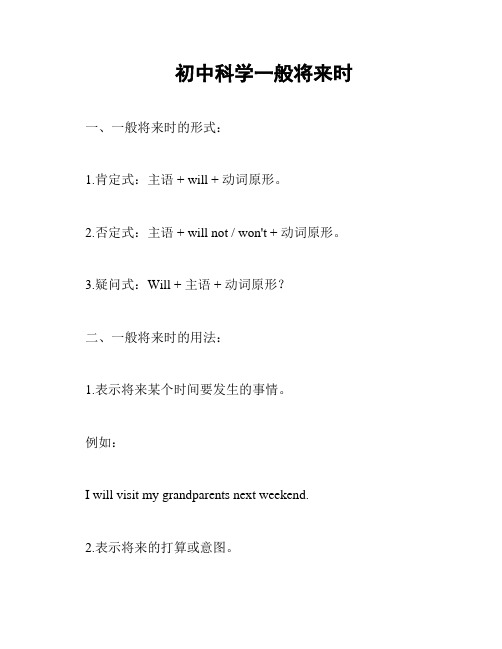
初中科学一般将来时一、一般将来时的形式:1.肯定式:主语 + will + 动词原形。
2.否定式:主语 + will not / won't + 动词原形。
3.疑问式:Will + 主语 + 动词原形?二、一般将来时的用法:1.表示将来某个时间要发生的事情。
例如:I will visit my grandparents next weekend.2.表示将来的打算或意图。
例如:He will study hard to pass the exam.3.表示一种预测或猜测。
例如:It will rain tomorrow.4.表示将来的惯或反复发生的动作。
例如:We will often go skating in winter. 三、一般将来时的注意点:1.将来时中有一些词,如:tomorrow, next week, next year 等,这些词本身已经表示将来的意思,所以一般将来时和这些词连用时,不需要在句中再用将来时。
例如:I will meet her tomorrow.2.在表示将来的时间的副词或短语中,要用一般现在时,而不是将来时。
例如:我会在他来的时候离开。
3.用于一般将来时的时间状语词:in the future(将来),tonight(今晚),next time(下次),soon(不久),tomorrow(明天),the day after tomorrow(后天),the day before yesterday(前天)等。
四、常见的一般将来时动词:1.动词接不定式,如:want, plan, hope, expect, promise, decide 等。
例如:I will help you with the housework.2.表示动作的持续或重复的动词,如:work, stay, live, play, swim 等。
例如:He will work hard in the future.例如:初中学生学习一般将来时,需要掌握以上的重点内容,同时注意词汇的积累和句型的多样化。
初中英语语法复习:一般将来时

初中英语语法复习:一般将来时一般将来时表示将来某一时刻的动作或状态,或将来某一段时间内经常的动作或状态。
常与一些表示将来的时间状语连用,如:tomorrow(明天),next week(下周),from now on(从现在开始);in the future(将来),in a few days等。
1、基本结构:be going to+动词原形 2. will+动词原形一般将来时:be going to+动词原形一般将来时:will+动词原形2. will 和be going to 的区别will 和be going to一般可以互用,但有时有区别:1)含时间和条件状语从句,如果主句是将来时,多用will.2)如果不是以人的意愿为转移,将来肯定会发生的动作和状态,多用will3)be going to根据迹象推测,有可能发生的事情或计划要做的事情。
3. there be 句型的一般将来式:1.There is/are going to be 2. There will be一、单项选择1.The old scientist ______ us a talk on future life next week.A.gives B.gave C.will give D.is giving2.—Jim, what are you going to do this weekend?—I ______ a movie with my dad.A.am watching B.watch C.watched D.am going to watch3.—Where’s mum?—She is trying on the new dress upstairs now. She _________ it to a party.A.wears B.wore C.will wear D.is wearing4.—What are you going to do next weekend?—There __________ a basketball match next Sunday. I want to watch it.A.will be B.will have C.is going to have D.are going to be 5.—Which team ________ the football match?—I’m not sure. The two teams both play well. Let’s wait and see.A.wins B.won C.is winning D.will win 6.Robots ________ us do some heavy and difficult jobs in the future.A.help B.helped C.are helping D.will help7.—What are you going to do next weekend, Wang Hui?—I ________ my grandparents next Sunday.A.visit B.visitedC.am visiting D.am going to visit8.I don’t know if it ________ sunny tomorrow. If it ________ sunny, I will go fishing. A.will be; is B.is; will beC.will be; is going to be D.is; is9.We are going to have a farewell party ________.A.now B.every day C.last week D.next Friday 10.There is going to ________ a basketball match tomorrow.A.be B.have C.is D.are11.Look at the dark clouds in the sky. It ________.A.is going to rain B.rained C.raining D.rainy 12.What ________you ________for tomorrow’s party?A.did; wear B.will; wear C.do; going to wear D.do; do13.He ________ busy this week. He ________ free next week.A.is; is B.will; will be C.is; will be14.There are many black clouds in the sky. It ________ soon.A.will rain B.rains C.rained D.is raining 15.It ________ warm in Dalian tomorrow.A.will be B.is C.does16.She will ________ a book about animals after school.A.buys B.buy C.is buy D.going to buy 17.Mike ________ his room yesterday, and he is going to ________ his homework tomorrow. A.cleaned; do B.cleaned; did C.clean; do18.—Our library is bright and beautiful.—Yes. Will you ________ us ________ it?A.shows; to B.show; aroundC.shows; around D.show; to19.Look! There are a lot of clouds in the sky. It is going to _______ soon.A.rains B.rainy C.be raining D.be rainy20.Li Ming ______ a T-shirt tomorrow.A.buys B.bought C.buy D.will buy 21.Sarah and I ______ a film next Sunday. We ______ horses last Sunday.A.am going to see; rode B.are going to see; rode C.will see; ride 22.—What are you going to do this weekend?—_______A.I’m going to visit my grandparents.B.I’m fine.C.I’m watching TV.D.I’m cleaning the room.23.—Peter! What is your plan for this Sunday?—I ________ my grandmother. She is in hospital.A.visit B.am visiting C.am going to visit 24.It’s cloudy all day today, but it ________ tomorrow.A.changes B.changed C.will change D.is changing 25.—Can your sister ________?—No, she can’t. But she ________ to swim next month.A.swims; is learning B.swim; is learningC.swims; is going to learn D.swim; is going to learn26.—When ________ you come back from London, Mary?—Last week. The River Thames is really beautiful and I ________ it again.A.do; visit B.did; visit C.do; am visiting D.did; will visit 27.This is our last night in China. We ________ home tomorrow.A.will fly B.fly C.flies D.flew 28.—Schools ________ different in the future.—Yes, you are right.A.is B.are C.were D.will be 29.—Why are you in a hurry, Cindy?—There ________ a basketball match between Class One and our class at 3 o’clock.A.are going to be B.will haveC.is going to have D.will be30.Tony _________ the Great Wall with his classmates next Sunday morning.A.visited B.visits C.will visit D.visit31.There ________ a sports meeting in our school next week.A.was B.were C.are D.is going to be 32.You can borrow this film—surely you _________ watching it.A.enjoy B.enjoyed C.will enjoy D.are enjoying 33.—Why are you in such a hurry, Peter?—I________ a basketball match between Class One and our class in ten minutes.A.join in B.am joining in C.joined in D.am going to join in 34.Robots and machines people do more work in the future.A.help B.will help C.are helping D.helped 35.After this exam, you ________ a wonderful holiday next month. Take it easy!A.have B.has C.had D.will have36.If it ______ rain tomorrow, my family ______ go for a walk in the park.A.isn’t, will B.doesn’t, willC.won’t, will D.won’t be, will37.—It’s hot here.—I ________ and open the window.A.go B.went C.am going D.will go 38.—When ________ Lingling ________ litter with her friend?—Next Saturday morning.A.does; collect B.did; collect C.will; collect D.is; collecting 39.Perhaps we ________ able to connect our minds to the Internet in the future.A.are B.were C.have been D.will be 40.—What’s your plan for the new term?—I ________ English well.A.learn B.learnedC.am learning D.am going to learn41.—Are you free? I’d like you to go to the museum with me.—Sorry, there _______ some important meetings this coming weekend.A.is going to have B.will have C.are going to be D.is going to be 42.There ________ schools in the future. Students will study at home.A.is going to have B.will be C.won’t have D.won’t be 43.—How will students learn then?—They ________ by computers in the classroom.A.studies B.studied C.will study D.is studying 44.—What are you going to do, Betty?—I’m going ________ football this afternoon.A.play B.to play C.played D.playing45.We hope ________ a computer on every student’s desk in the future.A.there is B.there wasC.there will have D.there will be46.—What are you going to do this Sunday?—I ________ a picnic with my parents.A.have B.had C.am having D.am going to have 47.We hope there ________ a war in the world. Everyone can live a happy life.A.will not have B.will be not C.is not going to be D.is not going to have 48.If you interview the estate agent, he ________ you much information about housing. A.gives B.gave C.will give D.is giving 49.—The radio says it ________ rain this afternoon, isn’t it?—No. I think it will be sunny.A.will go to B.is going to C.shall go to D.will be 50.Where __________ you __________ have a meeting tomorrow?A.do; go B.will; go C.are; go D.are; going to二、完成句子51.My mother will be back in an hour. (改为否定句)My mother back in an hour.52.The students will study at home in the future. (改为一般疑问句)the students at home in the future?53.Things will be different in the future. (变为一般疑问句)things in the future?54.There is a football match at the sports hall every day.(用tomorrow改写句子)a football match at the sports hall tomorrow.55.Alice is going to do her homework this afternoon. (改为—般疑问句)Alice her homework this afternoon?56.They are going to take a walk in the park. (就划线部分提问)they to in the park?57.They will meet at the school gate at 7 a.m. on Saturday. (对画线部分提问)they at the school gate?58.I’m going to learn English well because it’s very useful.(对划线部分提问)you going to learn English well?初中英语语法复习:一般将来时答案1.C【详解】句意:下周这位老科学家将给我们做一个关于未来生活的报告。
完整)初中一般将来时讲解
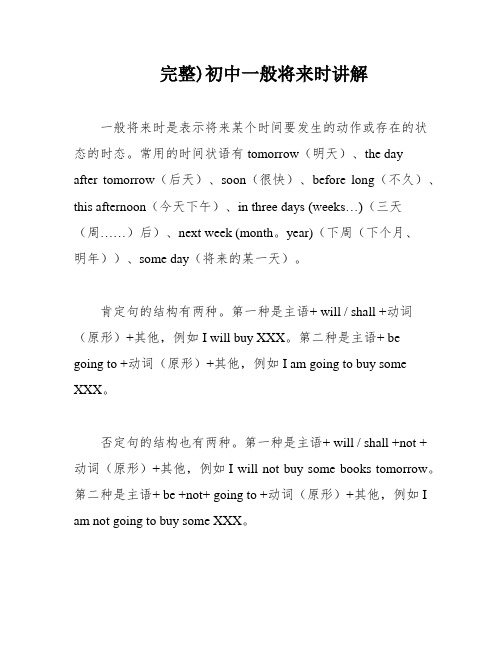
完整)初中一般将来时讲解一般将来时是表示将来某个时间要发生的动作或存在的状态的时态。
常用的时间状语有tomorrow(明天)、the dayafter tomorrow(后天)、soon(很快)、before long(不久)、this afternoon(今天下午)、in three days (weeks…)(三天(周……)后)、next week (month。
year)(下周(下个月、明年))、some day(将来的某一天)。
肯定句的结构有两种。
第一种是主语+ will / shall +动词(原形)+其他,例如I will buy XXX。
第二种是主语+ be going to +动词(原形)+其他,例如I am going to buy some XXX。
否定句的结构也有两种。
第一种是主语+ will / shall +not +动词(原形)+其他,例如I will not buy some books tomorrow。
第二种是主语+ be +not+ going to +动词(原形)+其他,例如I am not going to buy some XXX。
疑问句的结构也很简单。
第一种是Will / Shall +主语+动词原形+其他…?例如XXX?第二种是Be +主语+going to +动词原形+其他…?例如Are you going to buy some books tomorrow?肯定回答有两种方式。
第一种是Yes,主语+will,例如Yes。
I will。
第二种是Yes,主语+ be,例如Yes。
I am。
否定回答也有两种方式。
第一种是No,主语+will +not,例如No。
I will not。
第二种是No,主语+be + not,例如No。
I am not。
除了一般将来时,还有其他表示将来的时态,如be going to、be to(高中)、be about to(初中)。
初中英语语法汇总(一般将来时)

初中英语语法汇总(一般将来时)初中英语语法汇总〔一般将来时〕一、一般将来时的定义一般将来时表示在如今看来即将要发生的动作或存在的状态。
常用时间副词tomorrow, soon或短语next year / week / month, in a few days, in the future, sometime 做状语。
二、一般将来时的基本用法及构成〔1〕一般将来时的基本用法是表示单纯的将来事实,由"will / shall + 动词原形'构成:〔shall只用于第一人称〕例句:We shall have a lot of rain next month. 下个月将下许多雨。
I think she will pass the exam. 我想他考试会及格的。
〔2〕"be going to+动词原形'用来表示事先考虑过的将要发生的动作以及已有迹象说明必将要发生的某事,意为"准备;就要'。
如:1. Were going to meet outside the school gate. 我们准备在校门口见面。
2. Look! Its going to rain. 瞧!快下雨了。
(3) 用"be to+动词原形'表示。
主要表示按打算或支配即将要发生的动作;有时也表示指令、禁止或可能性:He is to leave for Beijing tomorrow. 他确定明天去北京。
Tell him hes not to be back late. 告知他不准迟回。
(4) 用"be about to+动词原形'表示。
主要表示即将要发生的事:He is about to leave. 他即将要离开。
Sit down, everyone. The film is about to start. 大家坐好,电影马上就要开发始了。
注:该结构通常不与具体的时间状语连用:误:He is about to leave soon [tomorrow].另外,该结构在美国英语中还可表示"准备'(主要用于否认句):Im not about to lend him any more money. 我不准备再借给他任何钱。
完整)初中英语一般将来时
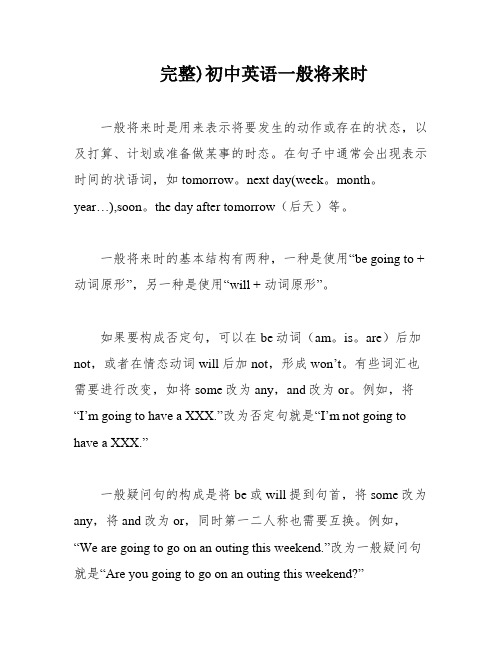
完整)初中英语一般将来时一般将来时是用来表示将要发生的动作或存在的状态,以及打算、计划或准备做某事的时态。
在句子中通常会出现表示时间的状语词,如tomorrow。
next day(week。
month。
year…),soon。
the day after tomorrow(后天)等。
一般将来时的基本结构有两种,一种是使用“be going to + 动词原形”,另一种是使用“will + 动词原形”。
如果要构成否定句,可以在be动词(am。
is。
are)后加not,或者在情态动词will后加not,形成won’t。
有些词汇也需要进行改变,如将some改为any,and改为or。
例如,将“I’m going to have a XXX.”改为否定句就是“I’m not going to have a XXX.”一般疑问句的构成是将be或will提到句首,将some改为any,将and改为or,同时第一二人称也需要互换。
例如,“We are going to go on an outing this weekend.”改为一般疑问句就是“Are you going to go on an outing this weekend?”对于划线部分的提问,一般将来时的对划线部分有三种情况。
第一种是问人,可以使用Who,例如“I’m going to New York soon.”改为问句就是“Who’s going to New York soon?”第二种是问干什么,可以使用What … do,例如“My father is going to watch a race with me this after noon.”改为问句就是“What is your father going to do with you this afternoon?”第三种是问什么时候,可以使用When,例如“She’s going to go to bed at nine.”改为问句就是“When is she going to bed?”同义句的构成是将be going to改为will,例如“I am going to go XXX.”可以改为“I will go XXX.”最基本的一般将来时结构是使用“will + 动词原形”,例如“XXX.”表示明天他们将要参观博物馆。
初中英语语法——一般将来时
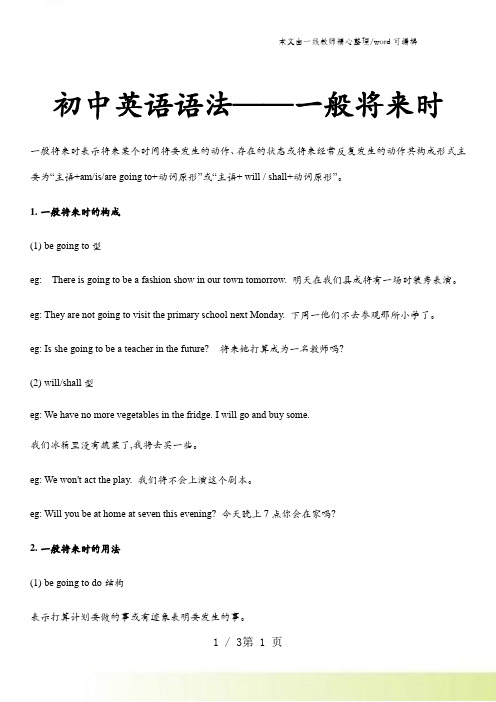
初中英语语法——一般将来时一般将来时表示将来某个时间将要发生的动作、存在的状态或将来经常反复发生的动作其构成形式主要为“主语+am/is/are going to+动词原形”或“主语+ will / shall+动词原形”。
1.一般将来时的构成(1)be going to型eg: There is going to be a fashion show in our town tomorrow. 明天在我们县成将有一场时装秀表演。
eg: They are not going to visit the primary school next Monday. 下周一他们不去参观那所小学了。
eg: Is she going to be a teacher in the future? 将来她打算成为一名教师吗?(2)will/shall型eg: We have no more vegetables in the fridge. I will go and buy some.我们冰箱里没有蔬菜了,我将去买一些。
eg: We won't act the play. 我们将不会上演这个剧本。
eg: Will you be at home at seven this evening? 今天晚上7点你会在家吗?2.一般将来时的用法(1)be going to do结构表示打算计划要做的事或有迹象表明要发生的事。
eg: I'm going to ski tomorrow.明天我要去滑雪。
(计划、打算)eg: It' s going to be a fine day tomorrow. 明天将会是个好天气。
(迹象表明要发生)(2) will /shall do 结构will/shall do 结构表示未经过事先考虑的意图,当主语是第一人称时用shall, will 可用于各种人称。
eg: How long will the work take? 这项工作要花多长时间? (推测)eg: From now on I will shall come for the newspapers every Monday.从现在起,我每周一都来拿报纸。
初中英语语法-一般将来时

一般将来时1. 用will/ shall do表示将来:shall 用于第一人称,will用于第二、三人称。
shall, will的缩写形式为’ll, 如:I’ll, you’ll等。
Shall not的缩写式为:shan’t, will not 的缩写式为:won’t . 一是表示预见You will feel better after taking this medicine.Do you think it will rain?二是表示意图.I will not lend the book to you.Take it easy,I will not do it any longer.基本结构:She will come to have class tomorrow.Will she come to have class tomorrow?She won’t come to have class tomorrow.What will she do tomorrow?2.用be going to do表示将来:肯定形式:①am/is/are going to + do;否定形式:①am/is/are going not to + do主要意义,一是表示―意图‖,即打算在最近的将来或将来进行某事。
Are you going to post that letter?How long is he going to stay here?I am going not to book a ticket.另一意义是表示―预见‖,即现在已有迹象表明将要发生或即将发生某种情况。
It’s going to rain.George is putting on weight; he is going to be quite fat.3.用be doing表示将来:主要意义是表示按计划、安排即将发生的动作,常用于位置转移的动词。
初中英语一般将来时
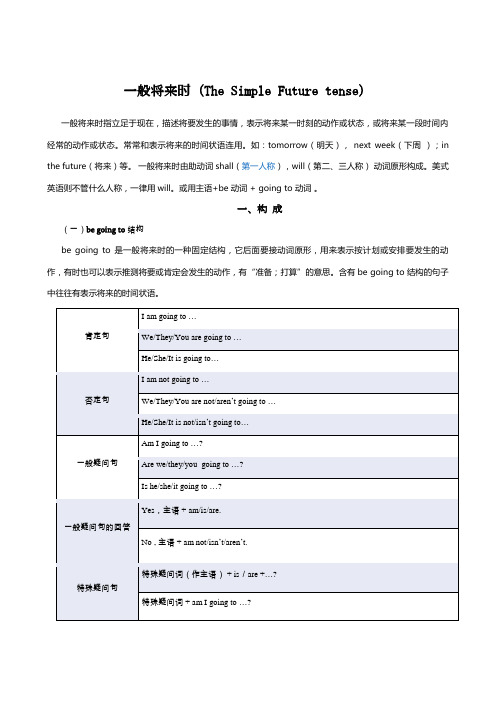
一般将来时(The Simple Future tense)一般将来时指立足于现在,描述将要发生的事情,表示将来某一时刻的动作或状态,或将来某一段时间内经常的动作或状态。
常常和表示将来的时间状语连用。
如:tomorrow(明天),next week(下周);in the future(将来)等。
一般将来时由助动词shall(第一人称),will(第二、三人称)动词原形构成。
美式英语则不管什么人称,一律用will。
或用主语+be动词+ going to 动词。
一、构成(一)be going to 结构be going to 是一般将来时的一种固定结构,它后面要接动词原形,用来表示按计划或安排要发生的动作,有时也可以表示推测将要或肯定会发生的动作,有“准备;打算”的意思。
含有be going to 结构的句子中往往有表示将来的时间状语。
I am going to move to another school next term.下学期我要搬到另一家学校。
He is not going to come to the get-together tomorrow. 他不打算参加明天的聚会了。
——Are they going to leave for Australia next week? 他们下周打算出发到澳大利亚吗?——Yes , they are. / No , they aren’t .是的。
/不。
What are you going to do this evening ?今晚你打算干什么?(二)will 结构I will finish all the housework very soon.我很快就会完成这些家务活。
They won’t move away until tomorrow.他们明天才搬走。
——Will Mr. white give us a lecture tomorrow ?史密斯先生明天给我们作讲座吗?——Yes, he will ./ No , he won’t .是的。
- 1、下载文档前请自行甄别文档内容的完整性,平台不提供额外的编辑、内容补充、找答案等附加服务。
- 2、"仅部分预览"的文档,不可在线预览部分如存在完整性等问题,可反馈申请退款(可完整预览的文档不适用该条件!)。
- 3、如文档侵犯您的权益,请联系客服反馈,我们会尽快为您处理(人工客服工作时间:9:00-18:30)。
一般将来时讲解与练习一、概念:表示将要发生的动作或存在的状态句中一般有以下时间状语:tonight,in the future,tomorrow, next day(week, month, year…),soon, the day after tomorrow (后天),in+段时间(在...之后)等。
二、基本结构:①主语+be going to + do;②主语+will+ do. ③主语(只能为I /We)+shall+do三、否定句:在①be动词(am, is, are)后加not;②will后加not 成won’t;③shall后加not成shan’t例如:I’m going to have a picnic this afternoon. → I’m not going to have a picnic this afternoon.四、一般疑问句:be或will或shall提到句首,some改为any, and 改为or,第一二人称互换。
例如:We are going to go for a walk this weekend.→ Are you going to go for a walk this weekend?五、对划线部分提问。
一般情况,一般将来时的对划线部分有三种情况。
1. 问人。
Who 例如:I’m going to New York soon. →Who’s going to New York soon.2. 问干什么。
What … do.例如: My father is going to watch a match with me this afternoon.→What is your father going to do with you this afternoon?3. 问什么时候。
When. 例如:She’s going to go to bed at nine. →When is she going to bed?六、同义句:be going to = willI am going to go swimming tomorrow. = I will go swimming tomorrow.七、be going to和will 的区别be going to和will 的用法虽然都表示将来发生动作或情况,但它们的用法是有区别的。
(1)be going to主要用于:1、表示事先经过考虑、安排好打算、计划要做的事情。
E.g.What are you going to do today? 今天你们打算做什么?Dad and I are going to watch an opera this afternoon. 今天下午我和爸爸打算去看歌剧。
I’m going to play the violin. 我打算拉小提琴。
She’s going to play the piano. 她打算弹钢琴。
2、表示根据目前某种迹象判断,某事非常有可能发生。
E.g.Look! There come the dark clouds. It is going to rain. 瞧!乌云密集,天要下雨。
I am afraid I am going to have a cold. 恐怕我要患重感冒。
(2) will主要用于在以下几个方面:1、表示单纯的未来“将要”通用各个人称。
eg:They will go to visit the factory tomorrow. 明天他们将去工厂参观。
I’ll come with Wang Bing, Liu Tao and Yang Ling. 我将和王兵、刘涛、杨玲一起来。
2、表示不以人的意志为转移的自然发展的未来的事。
eg:Today is Saturday. Tomorrow will be Sunday. 今天是星期六。
明天是(将)是星期日。
He will be thirty years old this time next year. 明年这个时候他就(将)三十岁。
3、问对方是否愿意做某事或表示客气地邀请或命令。
eg:Will you please turn on the radio? 请打开收音机好吗?Will you go to the zoo with me? 你和我一起去动物园好吗?八、一般将来是特殊用法:1) be +不定式表将来,按计划或正式安排将发生的事。
We are to talk about the report next Saturday.2) be about to +不定式,意为马上做某事。
He is about to leave for Beijing.注意:be about to 不能与tomorrow, next week 等表示明确将来时的时间状语连用。
3)有些表趋向性的动词可用想在进行时表将来:例如:go,come,arrive,fly(飞往),reach(到达),stay,leave,start, die...如:I’m going to go to the zoo this weenend.= I’m going to the zoo this weenend.He’s going to leave for Paris.= He’s l eaving for Paris. The old man is dying.=The old man will die. 这个老人要去世。
4)要注意“主将从现”这一语法现象:重要连词有: if (如果),as soon as (一....就...),when(当...时候),before,after,until(直到 not..until直到...才) , unless(=not...if 除非)...If it rains, we won’t have a picnic next wee k.I’ll tell you the news as soon as you come back.一般将来时除了使用“shall/will + V…”以外,也可以使用下列的几种句式来表达。
1.be going to + V …(即将会……;打算将……)例A:It is going to rain. Take an umbrella with you.(带一把伞去。
看样子就要下雨了。
)例B:The Browns are going to move to Australia.(布朗先生全家打算迁移到澳大利亚去。
)2.be about to + V (即将……,指紧接着要发生的动作。
)例:Let's wait a minute. He is about to arrive.(我们等一下。
他即将会到达。
)3.be + V-ing …(定于……,指接近的将来动作。
)例:He is leaving for Hong Kong tomorrow morning.(他定于明天早晨到香港去。
)4.be + to V (定于……,指预定的将来动作。
)例:She is to be here at 9:00 a.m. tomorrow.(她定于明晨九时到达这里。
)5.V-(e)s (定于……,指接近的将来动作,但不如第3项主观。
)例:He leaves for Hong Kong tomorrow morning.(他定于明天早晨到香港去。
——与(3)项的区别在于(3)项的动作是出自主语的决定,(5)项则不一定是出自主语的决定。
)常用于修饰一般将来时的时间副词有:tomorrow,tomorrow morning (afternoon, evening), next +时间(next night, next Monday …, next week, month…,next summer…, next year), in (the) future (将来),soon (不久之后),in +时间(in five days——再过五天,in two weeks——再过二星期),etc.练习:一、填空。
1. 我打算明天和朋友去野炊。
I ________ _______ _________ havea picnic with my friends.2. 下个星期一你打算去干嘛? 我想去打篮球。
What ________ ________ _________ _________ _________ next Monday?I _______ ________ _______ play basketball.3. 你妈妈这个周末去购物吗?是,她要去买一些水果。
________ your mother _______ ________ go shopping this___________?Yes, she _________. She ______ ________ __________ buy some fruit.4. 你们打算什么时候见面?What time _______ you ___________________ meet?二、改句子。
5. Nancy is going to go camping.(改否定) Nancy ________ going to go camping.6. I’ll go and join them.(改否定) I _______ go ______ join them.7. I’m going to get up at 6:30 tomorrow.(改一般疑问句)________ _______ ________ to get up at 6:30 tomorrow?8. We will meet at the bus stop at 10:30.(改一般疑问句)_______ ________ meet at the bus stop at 10:30?9. She is going to listen to music after school.(对划线部分提问)________ _______ she ________ ________ _________ after school?10. My father and mother are going to see a play the day after tomorrow.(同上)_________ _________ going to see a play the day after tomorrow?三、用所给词的适当形式填空。
11. Today is a sunny day. We __________ (have) a picnic this afternoon.12. My brother _______________ (go) to Shanghai next week.13. Tom often ____________(go) to school on foot. But today is raining ,he ______________ (go) to school by bike.14. What do you usually do at weekends?I usually __________ (watch) TV and __________(catch) insects?15. It’s Friday today. What ________she _________ (do) this weekend?She _________ (watch) TV and _________ (catch) insects(害虫).16. What ___________ (do) you do on Sundays? I ____________ (pick) apples on a farm.What ______________ (do) next Sunday? I ______________ (milk) cows.17. Mary ____________ (visit) her grandparents tomorrow.18. Liu Tao ____________ (fly) kites in the playground after school every Friday.19. David ______________ (give) a painting show next Monday.20. I ________________ (plan) for my study now.21.We ___________(buy) him a pen for his birthday next week.22.I____________(call)you when I get there.23.________ I _______(begin)to play computer games?24.If it ______(be) sunny tomorrow, we__________ (have)a picnic outside.25.I___________(tell)him the news when I see him at the office.26.There _______________(not be)a football match next month.27.---_________he_________(give)a talk on “Works ofa rt”next Friday?---No, he _______. He ______ (visit) the Palace Museum.28. Where______Tom_________ (go) the day after tomorrow?29. She ________ (not go) swimming this weekend.30. She _________(watch) TV every evening. But she __________ (not watch) TV tonight.四、单项选择:1.Mother ________ me a nice present on my next birthday.A. will givesB. will giveC. givesD. give2.He ________ her a beautiful hat on her next birthday.A. givesB. gaveC. will giveD. is going giving3. He __in three days.A. coming back B. came back C. will come back D. is going to coming back4. Who ________ ________ swimming with us tomorrow afternoon?A. will; goB. do; goC. will; goingD. shall; goes5. The day after tomorrow they ________ a volleyball match.A. will watchB. watchesC. is watchingD. to watch6. They ________ an English evening next Sunday.A. are havingB. are going to haveC. will havingD. is going to have7. ________ you ________ free next Sunday? A. Will; are B. Will; be C. Do; be D. Are; be8. He ________ there at ten tomorrow morning. A. will B. is C. will be D. be9. I ____ _____ a teacher in the future. A. will, be B. is, be C. is, being D. will, is10.They ____ _____ to the park next Sunday. A. will goes B. will go C. is going D. will go11.My family ____ _____ to church next weekend. A. will goB. goesC. will goingD. is going12.My mother will ____ me a pencil tonight. A. gives B. giving C. give13.He ______ play football tomorrow. A. will B. is C. be14.My grandpa and grandma ____ to see us in two days.A. will comingB. will comeC. is comingD. are coming15.She ___ ____ TV this evening. A. wills watch B. will watchingC. is watchingD. will watch16.My grandpa ____ _____ at home the day after tomorrow.A. will stayB. wills stayC. will staysD. is staying17.Mom will _____ back soon. A. comes B. coming C. comes D. Come初中英语时态详解及专项练习专题一单项选择( ) 1. There __________ a meeting tomorrow aft ernoon. A. will be going to B. will going to b e C. is going to be D. will go to be( ) 2. Charlie ________ here next month.A. isn't workingB. doesn't workingC. isn't going to wo rkingD. won't work( ) 3. He ________ very busy this week, he ________ free next week.A. will be; isB. is; isC. will be; will beD. is; will be( ) 4. There ________ a dolphinshow in the zoo tomorrow evening.A. wasB. is going to haveC. will hav eD. is going to be 5. -_____ you ______ free tomo rrow? - No. I _____ free the day after tomorrow.A. Are; going to; willB. Are; going to be; willC. Are; going to; will beD. Are; going to be; will be6. Mother ________ me a nice present on my next birthda y.A. will givesB. will giveC. givesD. give( ) 7. - Shall I buy a cup of tea for you? -________. (不,不要。
